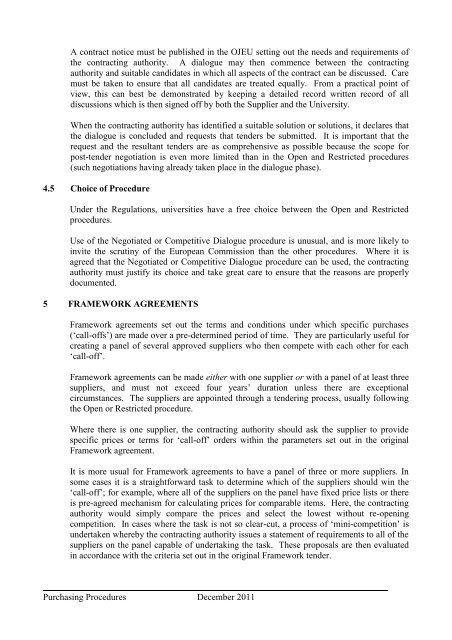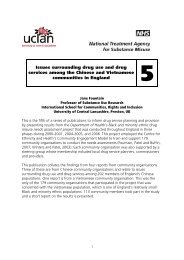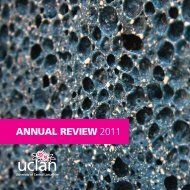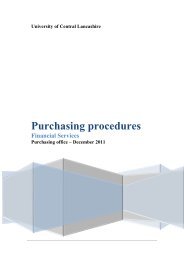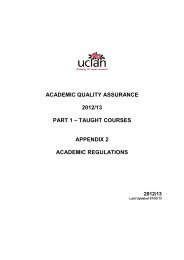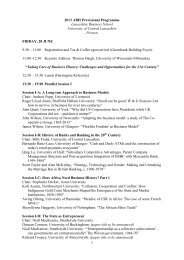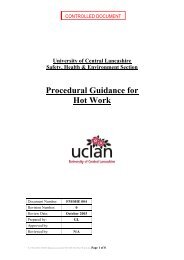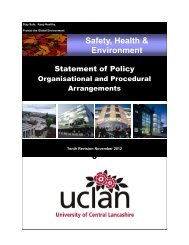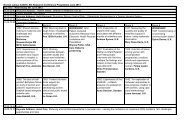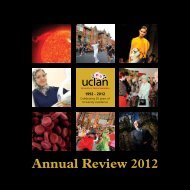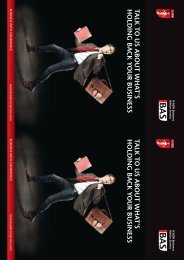PURCHASING PROCEDURES - University of Central Lancashire
PURCHASING PROCEDURES - University of Central Lancashire
PURCHASING PROCEDURES - University of Central Lancashire
Create successful ePaper yourself
Turn your PDF publications into a flip-book with our unique Google optimized e-Paper software.
A contract notice must be published in the OJEU setting out the needs and requirements <strong>of</strong><br />
the contracting authority. A dialogue may then commence between the contracting<br />
authority and suitable candidates in which all aspects <strong>of</strong> the contract can be discussed. Care<br />
must be taken to ensure that all candidates are treated equally. From a practical point <strong>of</strong><br />
view, this can best be demonstrated by keeping a detailed record written record <strong>of</strong> all<br />
discussions which is then signed <strong>of</strong>f by both the Supplier and the <strong>University</strong>.<br />
When the contracting authority has identified a suitable solution or solutions, it declares that<br />
the dialogue is concluded and requests that tenders be submitted. It is important that the<br />
request and the resultant tenders are as comprehensive as possible because the scope for<br />
post-tender negotiation is even more limited than in the Open and Restricted procedures<br />
(such negotiations having already taken place in the dialogue phase).<br />
4.5 Choice <strong>of</strong> Procedure<br />
Under the Regulations, universities have a free choice between the Open and Restricted<br />
procedures.<br />
Use <strong>of</strong> the Negotiated or Competitive Dialogue procedure is unusual, and is more likely to<br />
invite the scrutiny <strong>of</strong> the European Commission than the other procedures. Where it is<br />
agreed that the Negotiated or Competitive Dialogue procedure can be used, the contracting<br />
authority must justify its choice and take great care to ensure that the reasons are properly<br />
documented.<br />
5 FRAMEWORK AGREEMENTS<br />
Framework agreements set out the terms and conditions under which specific purchases<br />
(„call-<strong>of</strong>fs‟) are made over a pre-determined period <strong>of</strong> time. They are particularly useful for<br />
creating a panel <strong>of</strong> several approved suppliers who then compete with each other for each<br />
„call-<strong>of</strong>f‟.<br />
Framework agreements can be made either with one supplier or with a panel <strong>of</strong> at least three<br />
suppliers, and must not exceed four years‟ duration unless there are exceptional<br />
circumstances. The suppliers are appointed through a tendering process, usually following<br />
the Open or Restricted procedure.<br />
Where there is one supplier, the contracting authority should ask the supplier to provide<br />
specific prices or terms for „call-<strong>of</strong>f‟ orders within the parameters set out in the original<br />
Framework agreement.<br />
It is more usual for Framework agreements to have a panel <strong>of</strong> three or more suppliers. In<br />
some cases it is a straightforward task to determine which <strong>of</strong> the suppliers should win the<br />
„call-<strong>of</strong>f‟; for example, where all <strong>of</strong> the suppliers on the panel have fixed price lists or there<br />
is pre-agreed mechanism for calculating prices for comparable items. Here, the contracting<br />
authority would simply compare the prices and select the lowest without re-opening<br />
competition. In cases where the task is not so clear-cut, a process <strong>of</strong> „mini-competition‟ is<br />
undertaken whereby the contracting authority issues a statement <strong>of</strong> requirements to all <strong>of</strong> the<br />
suppliers on the panel capable <strong>of</strong> undertaking the task. These proposals are then evaluated<br />
in accordance with the criteria set out in the original Framework tender.<br />
Purchasing Procedures December 2011


